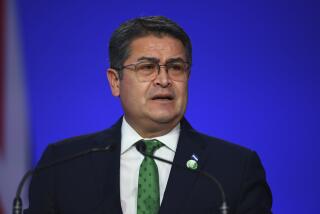Obama grants clemency to correct a sentence extended by a court typo
WASHINGTON -- President Obama on Tuesday commuted the sentence of a drug convict, correcting a mistake that had extended his prison time by more than three years and could not be fixed by the courts.
Ceasar Huerta Cantu was sentenced to 15 years of incarceration after pleading guilty in 2006 to money laundering and trafficking marijuana. But because of a typographical error in Cantu’s presentence report, the 180-month punishment reflected a greater penalty than called for under U.S. sentencing guidelines.
A federal judge acknowledged the numerical error but denied a motion to correct it in March 2013 because a one-year statute of limitations had expired, according to a court opinion.
“A judge ruled that Mr. Cantu did not discover this error in time to correct it through any judicial means,” White House Press Secretary Jay Carney said. “As a result, it can now only be rectified through clemency. The president thought it was the right thing to do to commute his sentence.”
Obama’s action reduced Cantu’s sentence by 3 1/2 years, bringing the penalty in line with the sentencing guidelines.
Compared with past administrations, the Obama White House has been more conservative in granting clemency, which also includes pardons. The president has issued 61 clemencies, according to Justice Department statistics. Over two terms, President George W. Bush offered commutations and pardons on 200 sentences, and President Clinton granted clemency nearly 460 times in his eight years, although many of them occurred near the end of his term.
Douglas Berman, a sentencing expert at Ohio State University’s law school, said commutations often carry messages. “Every commutation now, because they are so rare, is fraught with messages,” Berman said. “How people will perceive and interpret the message is a big question.”
He said, however, that in this case the administration may just have been filling its role as a last-resort option for correcting a judicial error. He criticized the administration for not issuing more information to explain its decision, though he acknowledged such statements were rare.
The administration typically announces several clemencies at one time, as was the case in December when the president granted 13 pardons and eight commutations. But Carney said “the president wanted to act as quickly as possible” in this case given the circumstances.
Berman said the latest commutation appeared aimed at fixing an “undisputed legal error.” The court decided it could not offer Cantu relief, Berman said, because of a federal statute of limitations created in part to avoid a flood of claims.
“The problem is when they impose those restrictions, they apply to everybody, including those who have an undisputed error,” he said.
The administration, in recent months, has hinted that it intends to make use of the president’s ability to reduce the penalties for low-level, nonviolent offenders who meet certain criteria and were sentenced under mandatory minimum laws. During a speech in January, Deputy Atty. Gen. James Cole said the administration hoped to identify potential candidates.
Cole also announced plans to inform federal prisoners of the opportunity to petition for clemency and called on bar associations to help potential candidates apply. The Department of Justice is expected to begin informing inmates “in the forthcoming weeks,” White House Counsel Kathryn Ruemmler announced in a speech Tuesday, according to prepared remarks.
A spokeswoman for the Justice Department said that Cantu’s petition was not part of that initiative and probably would have landed on the president’s desk regardless.
Cantu’s case may not “stand for an obviously larger principle,” Ruemmler said in her prepared remarks, but “demonstrates the importance of clemency as a fail-safe mechanism — when a worthy candidate runs out of other options, the president has the power to correct an injustice that no one else has.”
Kathleen Hennessey and Christi Parsons in the Washington bureau contributed to this report.
Twitter: @danielrothberg
More to Read
Get the L.A. Times Politics newsletter
Deeply reported insights into legislation, politics and policy from Sacramento, Washington and beyond. In your inbox three times per week.
You may occasionally receive promotional content from the Los Angeles Times.






